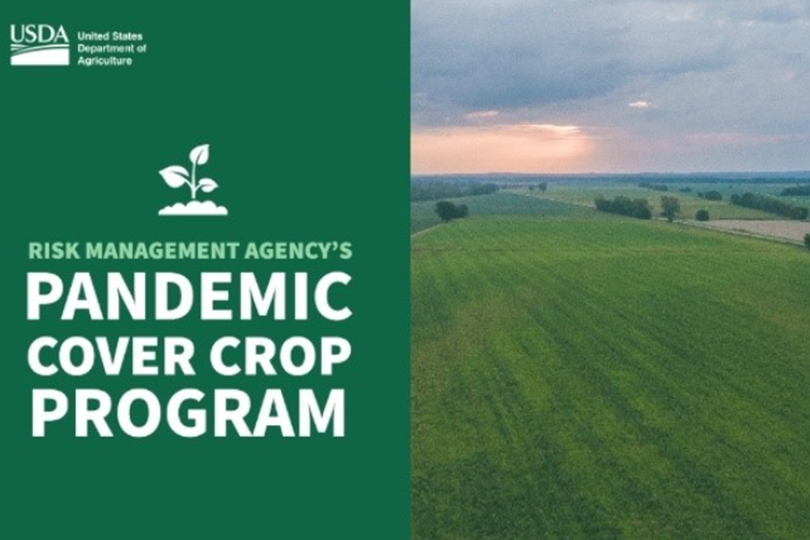Farmers and ranchers who have coverage under most crop insurance policies are eligible for a premium benefit from the U.S. Department of Agriculture (USDA) if they planted cover crops during the 2022 crop year.
To receive the benefit from this year’s Pandemic Cover Crop Program (PCCP), farmers and ranchers must report cover crop acreage by March 15.
The new program comes on the heels of the recently announced Partnerships for Climate-Smart Commodities that creates market opportunities for U.S. agricultural and forestry products that use climate-smart production practices and include innovative, cost-effective ways to measure and verify greenhouse gas benefits.
PCCP, offered by USDA’s Risk Management Agency (RMA), helps farmers maintain their cover crop systems, despite the financial challenges posed by the pandemic and is part of USDA’s Pandemic Assistance for Producers initiative, a bundle of programs to bring financial assistance to farmers and ranchers who felt the impact of COVID-19 market disruptions.
“Cultivating cover crops requires a sustained, long-term investment, and the economic challenges of the pandemic made it financially challenging for many producers to maintain cover crop systems,” RMA Administrator Marcia Bunger said. “Producers use cover crops to improve soil health and gain other agronomic benefits, and this program will reduce producers’ overall premium bill to help ensure producers can continue this climate-smart agricultural practice.”
PCCP was first offered in 2021, and producers with crop insurance received $59.5 million in premium subsidies for 12.2 million acres of cover crops.
About the Premium Benefit
PCCP provides premium support to producers who insured their crop with most insurance policies and planted a qualifying cover crop during the 2022 crop year. The premium support is $5 per acre, but no more than the full premium amount owed.
All cover crops reportable to FSA are eligible and include cereals and other grasses, legumes, brassicas and other non-legume broadleaves, and mixtures of two or more cover crop species planted at the same time.
To receive the benefit for this program, farmers must file a Report of Acreage form (FSA-578) for cover crops with USDA’s Farm Service Agency (FSA) by March 15. The cover crop fields reported on the Report of Acreage form must match what the farmer reported to their insurance company for crop insurance policies. To file the form, farmers must contact and make an appointment with their local USDA Service Center.
Additional PCCP details
Certain policies are not eligible because they have underlying coverage, which would already receive the benefit or are not designed to be reported in a manner consistent with the Report of Acreage form (FSA-578).
PCCP is not available for Enhanced Coverage Option, Hurricane Insurance Protection–Wind Index, Post-Application Coverage Endorsement and Supplemental Coverage Option.
Stacked Income Protection (STAX) and Margin Protection (MP) policies are only eligible for PCCP when insured as a standalone policy.
STAX and MP endorsements to underlying policies are not eligible for PCCP.
PCCP does not change acreage reporting dates, reporting requirements or any other terms of the crop insurance policy.
The rule can now be viewed in the Federal Register. More information, including frequently asked questions, can be found at farmers.gov/pandemic-assistance/cover-crops.
Additional pandemic assistance
PCCP is part of USDA’s broader response to the COVID-19 pandemic. RMA also extended a number of crop insurance flexibilities to Approved Insurance Providers (AIPs) and agricultural producers until June 30, 2022 or later. Originally, these flexibilities were expiring in January. USDA’s Pandemic Assistance for Producers also has provided additional support for farmers by improving and retargeting existing programs and creating new efforts to reach a broader set of farmers like PCCP.

